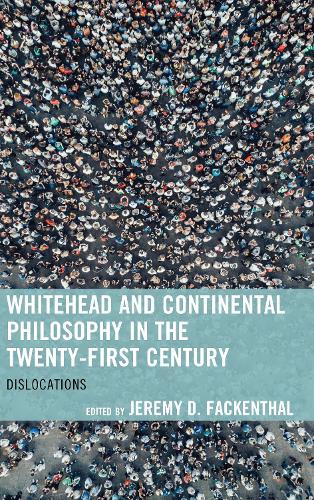
Whitehead and Continental Philosophy in the Twenty-First Century: Dislocations
(Hardback)
Available Formats
Publishing Details
Whitehead and Continental Philosophy in the Twenty-First Century: Dislocations
By (Author) Jeremy D. Fackenthal
Contributions by William Hammrick
Contributions by Walter Bo Eberle
Contributions by J. R. Hustwit
Contributions by Carl Dyke
Contributions by Jeremy D. Fackenthal
Contributions by Tano S. Posteraro
Contributions by Kris Klotz
Contributions by Elijah Prewitt-Davis
Contributions by Keith Robinson
Bloomsbury Publishing PLC
Lexington Books
29th April 2019
United States
Classifications
Professional and Scholarly
Non Fiction
Western philosophy from c 1800
Analytical philosophy and Logical Positivism
192
Physical Properties
Hardback
198
Width 159mm, Height 231mm, Spine 21mm
481g
Description
This book examines how the philosophy of Alfred North Whitehead, a speculative philosopher from the first half of the twentieth century, converses and entangles itself with continental philosophers of the twentieth and twenty-first centuries around the question of a sustainable civilization in the present. Chapters are focused around economic and environmental sustainability, questions of how technology and systems relate to this sustainability, relationships between human and nonhuman entities, relationships among humans, and how larger philosophical questions lead one to think differently about what the terms sustainable and civilization mean. The book aims to uncover and explore ways in which the combination of these philosophies might provide the dislocations within thought that lead to novel ways of being and acting in the world.
Reviews
The philosophy of Alfred North Whitehead (1861-1949) was marginalized for much of the later twentieth century, but it has achieved a new prominence in the twenty-first. The essays in this volume consider how Whitehead's thought resonates, in a variety of ways, with the concerns of recent continental philosophy. The authors here draw on Whitehead to consider matters all the way from the urgent need for humanitarian action to refined speculations on the nature of time. -- Steven Shaviro, Wayne State University
Guided by top scholars and thinkers, readers of this collection join a robust, multidisciplinary, and practical conversation that applies Whitehead's thought to the social and environmental realities of our time. Whitehead's work, often relegated to the realm of metaphysics, emerges as a bold and sensitive resource for action. Most importantly, the authors focus on the concrete -- real people, real crises, real movements providing both examples and reflection on how philosophy must engage, engage, engage. -- Donna Bowman, University of Central Arkansas
Author Bio
Jeremy D. Fackenthal is managing director for the Institute for Ecological Civilization and serves as adjunct faculty in the humanities for Vincennes University.
